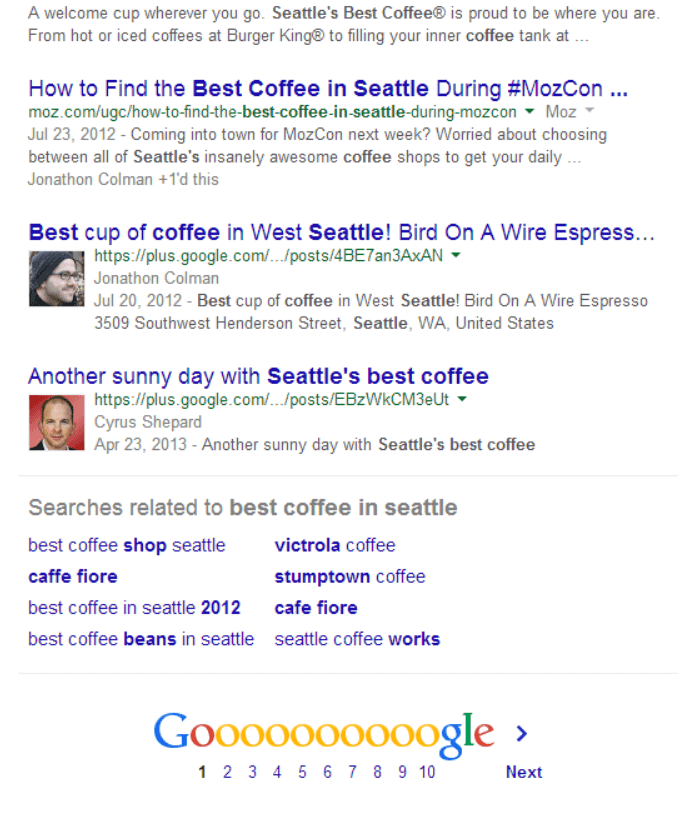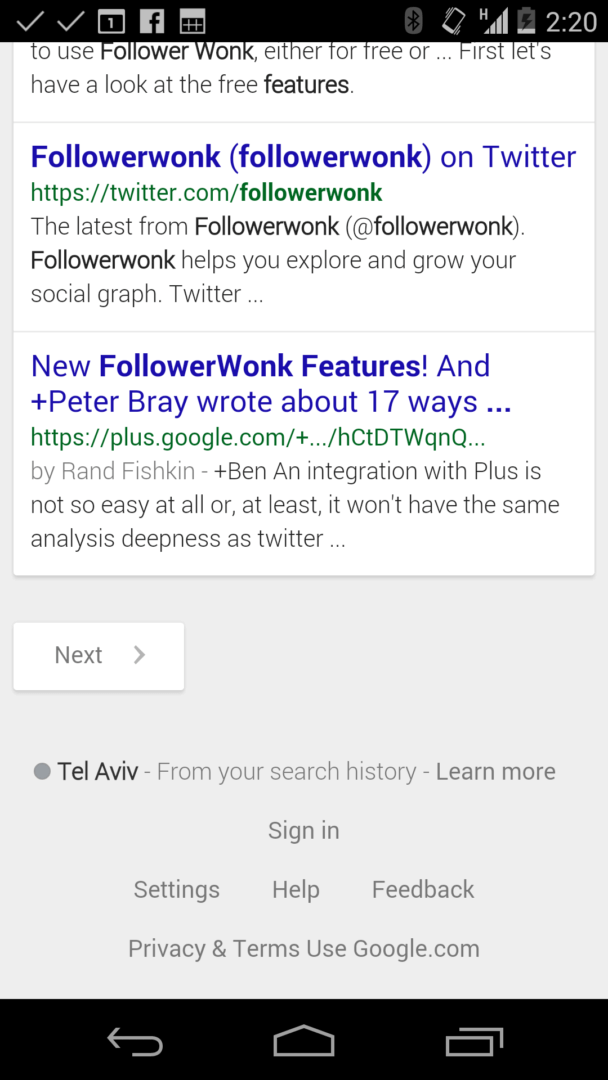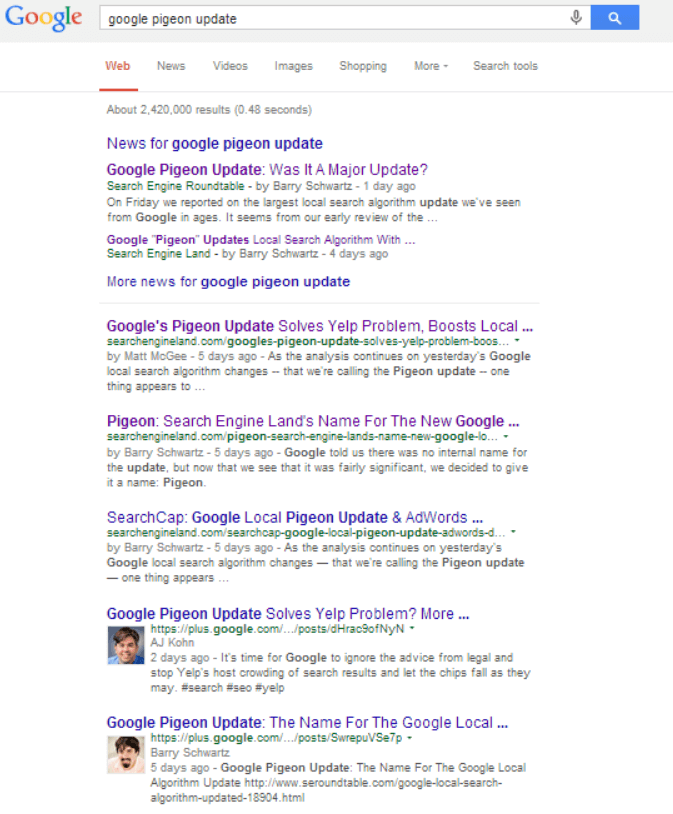Google+ Authorship Images Live On
Search engine optimization professionals were caught off-guard back in June when Google’s John Mueller announced that the search giant would be “simplifying” the way authorship is displayed in search results. This simplification involved the removal of profile photos and circle counts from the search listings of pages with authorship enabled. We all know the author […]
Search engine optimization professionals were caught off-guard back in June when Google’s John Mueller announced that the search giant would be “simplifying” the way authorship is displayed in search results.
This simplification involved the removal of profile photos and circle counts from the search listings of pages with authorship enabled.

We all know the author links are still present in search results (shown above). As such, I would still strongly advise any clients of mine who are actively blogging to correctly implement authorship.
But what if I told you that the profile images weren’t completely gone?
The Mixed Emotions Of Google Removing Authorship
Mueller’s announcement has been met with mixed responses. On one hand, people are criticizing Google for effectively “lying” to us, since having the image next to our articles was supposed to improve click-through rates from search listings.
(Note: I scoured the internet for an instance in which Google made that claim and didn’t find it — in fact, it turns out that might actually have been a claim made by users who were early adopters.)
On the other hand, people were praising the move, suggesting that the “add an authorship image” tactic had been abused. Truth be told, I have seen multiple instances where it indeed was — brands who hadn’t actually written anything had authorship showing up for their homepages. It was a strange but (presumably) effective tactic.
My personal feeling is that individuals who work hard to get their brand image to appear in search results deserve to have it stay there. If it’s true that the search engine results pages (SERPs) were looking cluttered or polluted, then Google needs to work on a better way to patrol the abuse.
But The Images Did Stay!
Say what? Didn’t you just say that Google removed the author images from their search results?
They did… but only from external sites.
Cue the cartoon:

DEAR MOTHER OF…. AUTHORSHIP IMAGES!
Sounds like Google + has just become very important for marketers.
The decision by Google to remove authorship images appears to apply only to external sites. Google+ posts, complete with author images, are still showing up regularly within search results for logged-in users.
Either this is Google’s clever way of drawing attention and engagement over to Google+, or they just forgot to shut this feature off. And I very much doubt the latter.
Regardless, the bottom line is that you authorship images still show up for people you are connected to. In the dozens of tests I did, Google+ finds its way into organic results. And this isn’t a one-off fluke. This is relatively consistent, obviously dependent on the size of your network.
Google+ Is Here To Stay, So This Matters In A Big Way
If you are wondering if this affects you, let me explain how it does. Three years ago, Google released the Google+ Project; and today, Google+ is still here.
It’s fair to assume that, despite debates on how active the network may or may not be, a significant number of people are likely using Google while logged in. And since simply being logged in will affect a user’s search experience, I would say this is a pretty important asset to optimize as we collectively work to get maximum exposure for ourselves and our clients.

Query: Best Coffee in Seattle
I can even take it a step further. Google+ continues to rank well even while logged out. While logged out on my phone, I still have public Google Plus results showing up and ranking relatively well (though without authorship image).

Query: Followerwonk Features
Some Observations & Caveats
There are some points that I need to make sure I clarify here:
- In order to see authorship images for Google+ posts, you have to be logged in to Google and viewing personalized search results. The authorship results with head shots are based on your personal Google+ network.
- Google Apps for Business cannot see this (see this Twitter thread)
- It’s a bit erratic depending on the query, but these Google+ posts tend to rank towards the bottom of the SERP.

Query: Users Leave Foursquare
I don’t know what causes certain Google+ posts to rank over others. In the tests I did, one post that ranked in the 10th position had 42 Plus Ones and 22 Shares; another post, for a much more significant and less niche search term, only had 20 Plus Ones and 3 Shares, yet it was shown in the 2nd position. I continue to see other posts showing up in random 4 and 5 spots as well.

Query: Google Pigeon Update
What Does This Tell Us As Marketers?
Well, for starters, I believe this tells us that Google+ just became a lot more important. That’s for sure. If you want another asset to rank, then post it on Google+ and share it publicly with your network.
But aside from finding ways to “manipulate” the search engine and “take advantage” of this feature, this network could be Google’s way of making Google+ more relevant and further proving its usefulness within standard search results. I would advise that anyone who wants to get additional exposure and further promote their content should focus a lot of attention on building a strong presence on Google+.
To be clear, when I say “strong presence,” I mean a strong following with active engagement — I don’t think there are any real shortcuts here.
Bottom line: Authorship lives on, and growing your presence on Google+ has just become huge for everyone.
Contributing authors are invited to create content for Search Engine Land and are chosen for their expertise and contribution to the search community. Our contributors work under the oversight of the editorial staff and contributions are checked for quality and relevance to our readers. The opinions they express are their own.
Related stories
New on Search Engine Land